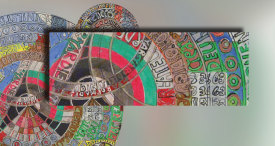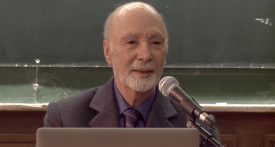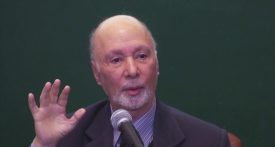Search results for tag "In vivo practice" - 10 answer(s)
108
Vote
After “Exploring our real self”, OstadElahi-inPractice now carries on with its series dedicated to the study and in-depth practical approach of the Fundamentals of the Process of Spiritual Perfection: A Practical Guide in a new lab tackling “The exercise of attention-dialogue”. Bahram Elahi already referred to this exercise in La Voie de la Perfection as “one of the pillars of the process of spiritual perfection”. In the Practical Guide it is the subject of a special chapter that can be considered a reference for both theory and practice. This chapter presents numerous “recommendations for a good practice”, providing students of the “new medicine of the soul” with many guidelines resulting from years of research and in-depth experimentation.
Read more
164
Vote
In dire times, it is not only human beings that are being tested, but the humanity in each of us. In the midst of generalised lockdown in place, here are a few reflections on the ethical significance of an unprecedented situation…
“My last point is practise humanity. We don’t talk about practising humanity, but now if ever there is a time to practise humanity, the time is now. The time is now to show some kindness, to show some compassion to people, show some gentility—even as a New Yorker.” Who spoke these words? The Governor of the State of New York, in a press briefing on March 21, 2020 to New Yorkers about the management of the coronavirus pandemic. That ethics should invite itself in such a way in political discourse is worth reflecting on. Other public voices out there struck the same chord: physicians, journalists, writers, etc.
I live in France, so when I realised that the ongoing situation was spontaneously interpreted by many in terms of what one should do as a human being, I had already been in lockdown for a week and it struck me as an echo of Bahram Elahi’s words in his latest book, Fondamentaux du perfectionnement spirituel : le guide pratique (Fundamentals of the Process of Spiritual Perfection: Practical Guide, forthcoming).
Read more
172
Vote
For our intention to become our own “hallowed tree”, it needs to be nurtured and that begins with words. The first stages of what Bahram Elahi calls in vivo practice, i.e. fighting against the imperious self and concretely putting into practice human virtues in everyday life and in contact with others, have to do with our words. The extraordinary thing about words is, precisely, that they are ordinary. Every minute of our lives in the most ordinary circumstances, we can do an act of humanity by choosing to speak or, on the contrary, not to speak.
Read more
283
Vote
In the latest French edition of The Path of Perfection published earlier this year, Professor Bahram Elahi presents a model of the human soul, or what he also calls the true self – a preview of which had already been given on this site. In this model, the soul, just like the body, is presented through a series of anatomy-like diagrams as an actual organism: a psychospiritual organism with which it is necessary to become familiar in order to perfect one’s humanity.
Read more
226
Vote
According to Ostad Elahi’s model of the self, we are bi-dimensional beings. We carry within ourselves a celestial part that, combined with our animal terrestrial part, forms our humanity. It is within this intimate combination—perhaps best compared to fertilization (when two gametes, or sexual cells, one male, the other female, unite to form a new zygote)—that our psychological and spiritual personality is forged. It is a crucible for our character traits and for the powers within us. In this equation, also lies the enigma of free will, in other words the question of evil
Read more
241
Vote
From a perspective of ethical perfection, to see ourselves in the mirrors of others is to take everything that emanates from them (actions, words, behaviour, etc.) as means to better know ourselves. Such was the general conclusion reached by Sandrine Duplessis in the first part of her inquiry. In this second part, the author gives us a few pointers as to how to concretely put this into practice.
Read more
227
Vote
“Know thyself”. This is certainly a beautiful maxim, but how can we expect to achieve such an end when part of ourselves is resisting so vigorously and preventing us from seeing our own faults? It is a fact: we tend to systematically overvalue ourselves and we are much more sensitive to the ethical wrongdoings of others than to our own. This two-part article by Sandrine Duplessis suggests that the solution may well lie in the problem: it is by changing our behaviour toward others that we may come to achieve a more lucid knowledge of ourselves.
Read more
200
Vote
After the success of the “One day, one Maxim – 28 days straight” lab, which was based on the volume entitled 100 Maxims of Guidance, OstadElahi-inPractice is about to launch a new lab that will follow the same dynamic and intensive format. This time, each day of the 28-day period will be devoted to meditating upon and putting into practice one of the sayings selected from Words of Truth (draft of the forthcoming English translation of Ostad Elahi’s oral teachings originally presented in the Persian book Bargozideh).
Read more
1574
Vote
The principles of a correct education of thought are not matters of intellectual speculation: it is through practice that they bear fruit. But what does putting them into practice actually mean? Bahram Elahi answers this question by pointing out the dangers of overly abstract approaches to practice and self-transformation. It is not enough to consider the principles in theory, or even to self-suggest them daily with the best willpower in the world: in order to “concretely feel” them, we must pitch them against reality.
Read more
1354
Vote
As far as spirituality goes, a purely theoretical approach to principles, detached from actual practice, will not do. Not only is it inefficient, it constitutes a genuine impediment to spiritual progress: that of smugness or spiritual “superioritism”. Professor Bahram Elahi spells this out in the following excerpt from a lecture given at the Sorbonne (Paris) […]
Read more
|

 News
News Podcast
Podcast













Recent Comments